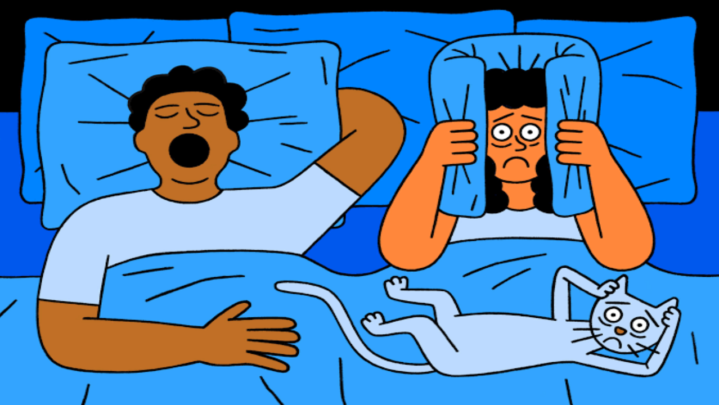Snoring is a raspy or loud sound produced by air passing through relaxed tissues in the throat, causing the tissues to vibrate while you breathe. Snoring is something that almost everyone does from time to time, but for some people, it can become a persistent problem. It might also be a sign of a major health problem.
The muscles in the roof of your mouth (soft palate), tongue, and throat relax when you fall asleep and proceed from light to deep sleep. The tissues in your throat can loosen to the point where they partially block and vibrate your airway.
The airflow grows more strong the narrower your airway becomes. This causes your snoring to get louder by increasing tissue vibration.
The Mayo Clinic suggests that the following conditions can produce snoring by affecting the airway:
1. The structure of your mouth- Your airway can be narrowed if you have a low, thick soft palate. Obese people may have additional tissues in the back of their throats, causing their airways to shrink. Airflow can also be impeded and vibration increased if the triangular portion of tissue hanging from the soft palate (uvula) is extended.
2. Consumption of alcohol- Snoring can also be caused by drinking too much alcohol before going to bed. Alcohol weakens your natural defences against airway congestion by relaxing your throat muscles.
3. Nasal issues- Snoring can be caused by chronic nasal congestion or a crooked barrier between your nostrils.
4. Sleep deprivation- If you don’t get enough sleep, your throat will relax even more.
5. Position for sleeping- Because gravity’s action on the throat narrows the airway, snoring is the most common and loudest when lying on the back.
Risk factors that may contribute to snoring include:
1. Being a man is a difficult task. Men are more prone than women to snore or suffer from sleep apnea.
2. Being overweight is a problem. Overweight or obese people are more likely to snore or suffer from obstructive sleep apnea.
3. Having a restricted airway. A lengthy soft palate, big tonsils, or adenoids in some persons can constrict the airway and induce snoring.
4. Taking alcoholic beverages. Because alcohol relaxes your throat muscles, you’re more likely to snore.
5. Having nasal problems. Snoring is more likely if you have a structural problem in your airway, such as a deviated septum, or if your nose is frequently congested.
Keep reading successyeti.com.





